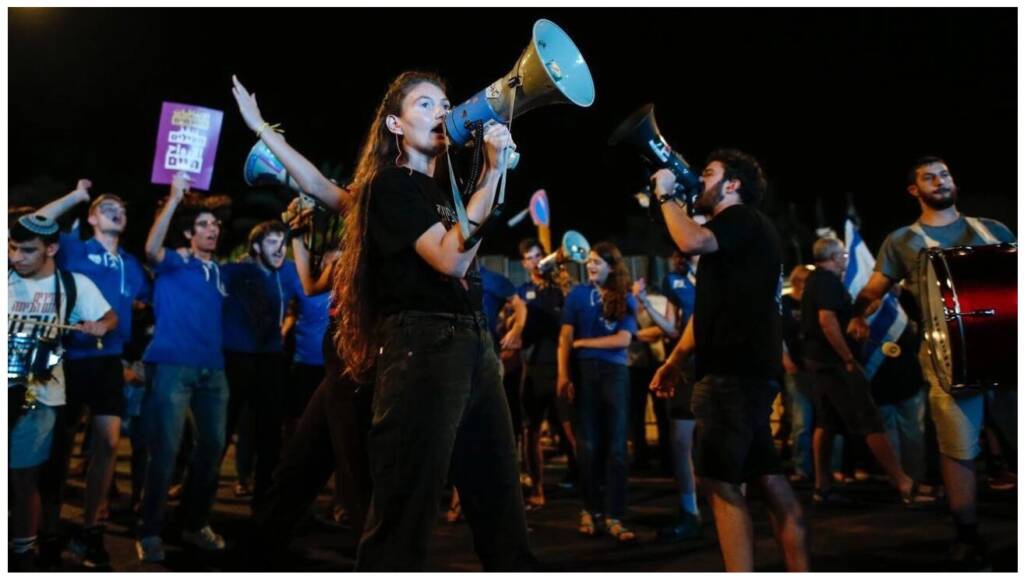As Israel faces the devastating news of six more hostages killed in Gaza, including the young Israeli-American Hersh Goldberg-Polin, the political environment in the country is experiencing a seismic shift. Thousands of people, some of them weeping, gathered Sunday night outside Netanyahu’s office in Jerusalem. In Tel Aviv, hostages’ relatives marched with coffins to symbolize the toll. “We really think that the government is making these decisions for its own conservation and not for the lives of the hostages, and we need to tell them, ‘Stop!’” said Shlomit Hacohen, a Tel Aviv resident.
Prime Minister Benjamin Netanyahu, once hailed as a stalwart leader during times of crisis, now finds himself at the center of public outrage and political uncertainty.
The discovery of the hostages’ bodies, found in an underground tunnel in Rafah, has ignited anger across Israel. From the streets of Tel Aviv to the southern city of Eilat, tens of thousands of Israelis have taken to the streets in what is being described as one of the largest nationwide protests since the war with Hamas began. Protesters are demanding immediate action from Netanyahu, with many accusing him of stalling efforts to secure a ceasefire-for-hostages deal.
The outcry is not just confined to the streets. Israel’s largest labor union, Histadrut, has called for a general strike, threatening to shut down the entire Israeli economy. The chairman of the union, Arnon Bar-David, has been vocal in his criticism, warning that the country is in a “downward spiral” and that drastic measures are necessary to shock the government into action.
Netanyahu, who has long been a polarizing figure in Israeli politics, now faces perhaps the greatest challenge of his career. The prime minister has been accused by hostage families and supporters of prioritizing military objectives over the safe return of the captives. This perception has only been reinforced by the recent deaths, with critics arguing that the government’s hesitancy to finalize a ceasefire deal may have cost these hostages their lives.
The political ramifications are profound. Netanyahu’s approval ratings, already bruised by his handling of the war, could plummet further as public trust erodes. The recent protests, marked by dramatic scenes of demonstrators blocking highways and clashing with police, reflect a nation increasingly divided over its leadership. The chants of “we won’t abandon them” heard across Israel underscore a growing sentiment that Netanyahu has failed to protect Israeli citizens—a charge that could have long-lasting implications for his political future.
Within Netanyahu’s own cabinet, cracks are beginning to show. Defense Minister Yoav Gallant, who has found himself increasingly isolated, warned his colleagues that the current path could lead to further failure in achieving Israel’s goals. Gallant’s stark message—“If we want the hostages alive, we don’t have time”—signals a rift within the government, as some officials push for more urgent action while others remain cautious.
The strain is not only political but also deeply personal for Netanyahu, who now faces the unenviable task of navigating a deeply divided government while under intense public scrutiny. His handling of the hostage crisis will likely define his legacy, for better or worse.
The situation has also caught the attention of international leaders, with the United States playing a key role in the negotiations. Senior U.S. officials have expressed frustration with Hamas, questioning the group’s seriousness about reaching a deal after the killing of three hostages who were set to be released. This development adds another layer of complexity to an already fraught diplomatic effort, putting additional pressure on Netanyahu to secure a resolution.
As Israel stands at a crossroads, Netanyahu’s future remains uncertain. The prime minister, who has weathered numerous political storms throughout his career, must now contend with a growing chorus of voices calling for change. The question remains: can he regain the public’s trust and steer the nation through this crisis, or will the mounting discontent lead to his political downfall?
